Unit3 Last weekend第三课时教学设计
小学英语PEP人教版三年级下册《Unit_3_last_weekend》教案9

小学英语PEP人教版三年级下册《Unit_3_last_weekend》教案9一. 教材分析《PEP人教版小学英语三年级下册》Unit 3 Last Weekend主要讲述了学生们在上个周末所做的事情。
通过本节课的学习,学生能够掌握一般过去时态,描述自己和他人在过去的时间所做的事情。
教材通过图片和对话的形式,让学生们在真实的情景中学习英语,提高他们的语言运用能力。
二. 学情分析三年级的学生已经掌握了基本的英语语音、词汇和简单的句子结构,具备了一定的英语听说能力。
但是,对于一般过去时态的掌握还不够熟练,需要在教学中进行针对性的练习和巩固。
此外,学生们在学习过程中,需要更多的实际操作和互动,以提高他们的学习兴趣和积极性。
三. 教学目标1.知识目标:–能够听懂、会说、会读关于一般过去时态的句子。
–能够用一般过去时态描述自己和他人在上个周末所做的事情。
2.能力目标:–能够通过图片和情景,理解一般过去时态的用法。
–能够在实际情景中,运用一般过去时态进行交流。
3.情感目标:–培养学生对英语学习的兴趣,增强自信心。
–培养学生与他人合作、交流的能力。
四. 教学重难点•一般过去时态的语法知识。
•描述过去时间所做的事情的句子结构。
•一般过去时态的运用,特别是在实际情景中的运用。
•准确理解和运用描述过去时间的句子结构。
五. 教学方法1.情境教学法:通过设置真实的情景,让学生在实际环境中学习英语,提高他们的语言运用能力。
2.交际教学法:引导学生参与课堂互动,培养他们的交流能力和团队合作精神。
3.任务型教学法:通过完成具体的任务,让学生在实践中学习英语,提高他们的学习兴趣和积极性。
六. 教学准备1.教材:PEP人教版小学英语三年级下册。
2.多媒体设备:电脑、投影仪、音响等。
3.教学图片:与本节课内容相关的图片。
4.教学卡片:含有本节课重点单词和句型的卡片。
5.教学录音:与本节课内容相关的一般过去时态的录音。
七. 教学过程1.导入(5分钟)利用多媒体展示一系列与本节课内容相关的图片,引导学生猜测图片中的人们在做什么。
人教版六年级下册英语Unit3《LastWeekend》教案

人教版六年级下册英语Unit3《LastWeekend》教案《Last Weekend》教案(一)教学目标1. 能够理解对话大意,并回答对话下问题。
能按照正确的语音、语调及意群朗读对话,并能进行角色表演。
2. 能够听、说、读、写,并在情景中运用句型How was your weekend? It was good. Did you do anything else? 提问并回答有关周末活动的安排。
3. 能够在语境中理解生词drank的意思,并能正确发音。
教学重难点1. 重点:运用句型How was your weekend? It was good. Did you do anything else? 提问并回答有关周末活动的安排。
2. 难点:一般过去时动词词尾的规则变化。
教学过程一、课前展示1. 师生相互问候。
2. 教师利用头脑风暴活动激发学生的背景知识,复习相关的动词及动词词组。
教师请学生说出周末一般做什么,复习有关周末活动的词汇。
如果学生不能够说出很多单词或词组,教师可在课件上出示词组,引导学生描述自己周末一般做什么。
二、情境导入1. 呈现重点句型(1) 教师展示日历,请学生回忆上周末做了什么。
教师引导学生说出上周末的活动安排,并用一般过去时的句子转述,请学生感受使用一般过去时的语境。
师生对话示例如下:T: How was your weekend? Busy? Happy? What did you do?Ss: I do my homework.T: Oh, you did your homework last weekend.T: What else did you do?…(2) 教师说出自己上周末所做的事,并将句子呈现在课件上。
课件内容示例如下:I was very busy last weekend.I cleaned my room last Saturday morning.I washed my clothes last Saturday afternoon.I cooked a meal last Sunday evening.I watched TV last Sunday evening.三、自主合作教师在课件上呈现两组句子,引导学生认真观察,并尝试找出规律。
PEP六年级英语Unit3 Last Weekend全英教案
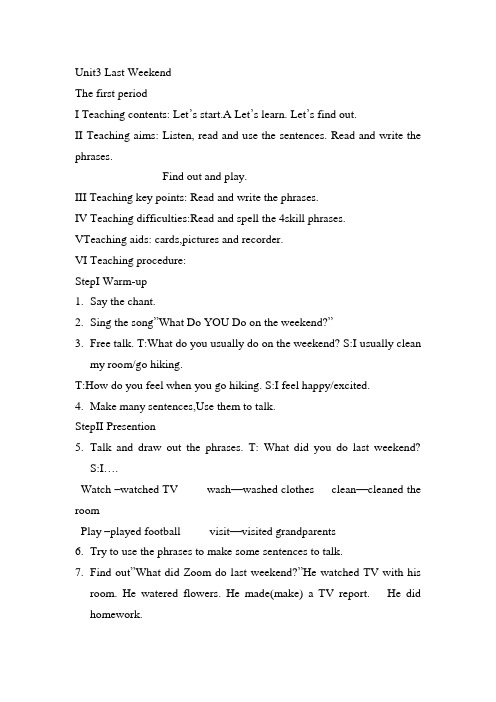
Unit3 Last WeekendThe first periodI Teaching contents: Let’s start.A Let’s learn. Let’s find out.II Teaching aims: Listen, read and use the sentences. Read and write the phrases.Find out and play.III Teaching key points: Read and write the phrases.IV Teaching difficulties:Read and spell the 4skill phrases.VTeaching aids: cards,pictures and recorder.VI Teaching procedure:StepI Warm-up1.Say the chant.2.Sing the song‖What Do YOU Do on the weekend?‖3.Free talk. T:What do you usually do on the weekend? S:I usually cleanmy room/go hiking.T:How do you feel when you go hiking. S:I feel happy/excited.4.Make many sentences,Use them to talk.StepII Presention5.Talk and draw out the phrases. T: What did you do last weekend?S:I….Watch –watched TV wash—washed clothes clean—cleaned the roomPlay –played football visit—visited grandparents6.Try to use the phrases to make some sentences to talk.7.Find out‖What did Zoom do last weekend?‖He watched TV with hisroom. He watered flowers. He made(make) a TV report. He did homework.StepIII Practice8.Do the exercise in the exercises books.9.Then check the answer.10.M ake a new dialogue.Bb writing:Watched TV washed clothes cleaned the room played football visited grandparentsWatch wash clean play visitHomework: Write the phrases and use it to talk.The second periodI Teaching contents: A Let’s try. Let’s talk. Let’s chant. C Pronunciation II Teaching aims:Read and write the sentences. Sing the e the dictionary.III Teaching key points:Use and write the sentences.IV Teaching difficulties:Pronouce the words.V Teaching aids:word cards,blank,tape and recorder.VI Teaching procedure:StepI Warm-up1.Say the chant.2.Make the new chant.3.Free talk. T:What did you do last weekend? S:I….4.Spelling game.StepII Presentation5.Listen and circle.6.Show out the pictures,Learn to talk. T:What did you do last weekend?W:I played football…7.Answer the questions. What did Wu do last weekend? He playedfootball and visited grandparents.StepIII Practice8.Talk and find out. What did you do yesterday? I …..9.Pronouce the words./ɪə/ear /eə/ air /ʊə/ sure10.D o the exercises in the workbooks.Bbwriting: What did you do last weekend? I played football. Homework: Read the dialogue for 5times. Make the new dialogue.The third periodI Teaching contents: A Let’s read. Let’s play. C story timeII Teaching aims: Read the text and answer the question. Play the game,then improve the memory. Understand the story.III Teaching difficulties: Read and understand the text.IV Teaching key points:Can use the past time words.V Teaching aids:Pictures,tape,recorder and a calendar.VI Teaching procedure:Step I warm-up1,Listen to the song.‖What did you do?‖&‖At the zoo‖2.Say the chart.3.Free talk.Talk the dialogue in pg 29.StepII Presention4.Show out the picture of the story. Depend it to tell the story. Listen tothe tape,try to find out what Zoom did last weekend.5.Ask some students to answer the question about the story.6.Ask some questions,then begin to read the text. After listen to the tape,discuss the answer.7.Finish the sentences in the textbook.StepIII Practice8.Play the game. I cleaned the room. I cleaned the room and played football. I cleaned the room ,played football and watched TV.I….1.Do the exercises in the workbooks.2.Depend the text to write a composition‖My Last Weekend.‖Homework: Write a composition‖My last weekend‖for 100words.The fourth periodI Teaching contents:B Let’s learn.Let’s play. C Good to know. Let’s sing. II Teaching aims:Listen,say and write the e the sentences to talk.Play the momery game.III Teaching key points:Write and use the 4skills words.IV Teaching difficulties:Know some words for past time.V Teaching aids:Cards, tape,recorder and pictures.VI Teaching Methods: TPR, Reading, Acting.VII Learning Methods:speaking, listeningVIII Teaching procedures:StepI Warm-up1.Sing the song‖At the zoo‖.2.2.Read the text in page 30.3.Ask some students to retell the story.StepII Presentation4.Do the action.Draw out the phrases. Went to a park---go to a park went fishing---go fishing went swimming--- go swimming went hinking--- go hinkingread a book—read a booke the phrases to make sentences. Then use the sentences to talk.6.Act and talk. Ask some students to act the action. The others try totalk,depend the action.Step III practice7.Practise the phrases in group. Use them to make dialogue.8.Show out the pictures.Tell students some good to know.9.Do the exercises in workbooks.10.T hen check the answer.11.S how out the sign cards,tell about them.Bbwriting: went_go {to a park/fishing/swimming/hiking}read-read[red] a bookHomework: Write the words and phrases for 5times and make somesentences.The fifth periodI Teaching contents: Let’s chant.B Let’s try.Let’s talk.Let’s find out.II Teaching aims:Listen ,say and write the sentences and words.Listen and try the correct answer Pronouce the words. Say the chant.III Teaching key points:Use the sentences.IV Teaching difficulties: Use the past time words.V Teaching Methods:direct method,actingVI Learning Methods:speaking listening.VII Teaching aids:word cards,tape and recorder.VIII Teaching procedure:Step I Warm-up1.Sing the song.‖At the zoo.‖2.Free talk.3.Show out the word cards,spell them. Then make some sentences forthem,.StepII Prensentation4.Say the chant after the tape.5.Talk about the pictures.What did John do yesterday? He went to apark./went fishing./went swimming./watched TV. Then listen to the tape and choose the correct one.6.Let’s talk.Show out the pictures,talk about them. Did Zhang goswimming? Yes,he did.Did Zhang go swimming? No,she didn’t. Did …clean the room? No,she did n’t.StepII Practice7.Make new dialogue about the pictures. Then ask some pairs to showout it.8.Make a survey and finish the blank. Q:Did you go swimming on theweekend? A:Yes, I did./No, I didn’t.9.Do the exercises in the workbook. Then check the answer.Bb writing: Did you read books? Yes,I did./No,I didn’t.Homework: Use the sentences to make the dialogue.The sixth periodI Teaching contents:B Let’s read. C Let’s check. Task time.II Teaching key points: Read the text, then answer the question.III Teaching aims: Understand the text. Finish the task.Check the answer. IV Teaching difficulties: Read and understand the sentences in the text.V Teaching themods:TPR,communicative approach,task-based language teachingVI Learning themods: speaking,cooperativeVII Teaching aids:pictures,tape and recorder.VIII Teaching procedure::StepI Warm-up1.Say the chant.2.Daily talk.3.Say the ―tongue twister‖.4.Do the action and say.fly kite/read book etc.StepII Presentaion5.Listen to the tape and find out the past time phrases or words.①Was-is walked-walk studied-study read-read.②Went-go flew-fly was-is③Saw-see jumped-jump swam-swim returned-reture was-am6.Listen and depend the picture,learn to say the text.Then answer thequestions.7.Finish the exercises in the text.8.Do the survey,then finish the blank.StepIII Practise9.Listen to the tape,then finish the exercises in page 35.10.T hen check the answer.11.D o the exercises in the workbook.12.R etall the story about the dog and Zhang Peng.Bb writing: was—is went—go walked—walk flew—fly studied—study read—readHomework:Read the text for 5times.。
小学英语PEP人教版三年级下册《Unit_3_last_weekend》教案2

小学英语PEP人教版三年级下册《Unit_3_last_weekend》教案2一. 教材分析《PEP人教版小学英语三年级下册》Unit 3 “Last Weekend” 主要围绕学生们上个周末的活动展开。
通过学习本单元,学生将能够掌握一般过去时的表达方式,描述自己和他人的过去活动。
本单元的语言点包括一般过去时的动词形式变化,以及相关的时间状语。
二. 学情分析三年级的学生已经掌握了基本的英语语音、词汇和简单的句子结构,具备一定的听、说、读、写能力。
但对于一般过去时的表达和时间状语的运用还不够熟练。
因此,在教学过程中,需要结合学生的实际情况,逐步引导他们理解和运用本课的语言点。
三. 教学目标1.知识目标:学生能够听懂、会说、会读本课的生词和句子,掌握一般过去时的表达方式,运用时间状语描述过去的活动。
2.能力目标:学生能够在实际情境中运用所学语言进行交流,提高英语表达能力。
3.情感目标:培养学生热爱生活,积极向上的心态。
四. 教学重难点1.重点:学生能够听懂、会说、会读本课的生词和句子,掌握一般过去时的表达方式。
2.难点:时间状语的运用,以及一般过去时动词形式的变化。
五. 教学方法采用情境教学法、交际法、任务型教学法等,通过图片、视频、游戏等多种形式,激发学生的学习兴趣,提高他们的参与度和积极性。
六. 教学准备1.教学课件:包括图片、视频、动画等。
2.教学道具:与本课主题相关的小物件。
3.练习题:用于课后巩固所学内容。
七. 教学过程1.导入(5分钟)通过展示一张上周六的图片,引导学生谈论自己上周六的活动,为新课的学习营造一个轻松愉快的氛围。
2.呈现(10分钟)展示本课的生词和句子,让学生初步感知一般过去时的表达方式。
通过图片和实物,引导学生理解和记忆生词。
3.操练(10分钟)采用分组练习、角色扮演等形式,让学生在实际情境中运用所学语言进行交流,提高他们的口语表达能力。
4.巩固(10分钟)通过完成练习题,检查学生对生词和句子的掌握情况,巩固所学知识。
小学英语PEP人教版三年级下册《Unit_3_last_weekend》教案4

小学英语PEP人教版三年级下册《Unit_3_last_weekend》教案4一. 教材分析《PEP人教版小学英语三年级下册Unit 3 Last weekend》主要讲述了学生们在上周末所做的事情。
通过本节课的学习,学生们将能够掌握一般过去时的表达方式,以及如何用英语询问和描述别人上周末的活动。
教材通过图片和对话的形式,让学生们在实践中学习和运用英语。
二. 学情分析三年级的学生已经掌握了基本的英语语法和词汇,具备一定的听说读写能力。
但是,对于一般过去时的表达和运用还比较陌生。
因此,在教学过程中,需要通过实例和实践活动,让学生们充分理解和掌握一般过去时的表达方式。
三. 教学目标1.知识目标:让学生掌握一般过去时的表达方式,能够用英语询问和描述别人上周末的活动。
2.能力目标:提高学生的听说读写能力,培养学生的英语思维和跨文化交际能力。
3.情感目标:激发学生学习英语的兴趣,培养学生的合作意识和团队精神。
四. 教学重难点1.重点:一般过去时的表达方式。
2.难点:如何用英语询问和描述别人上周末的活动。
五. 教学方法采用任务型教学法、情境教学法和交际教学法,通过图片、对话、游戏、角色扮演等多种形式,激发学生的学习兴趣,提高学生的听说读写能力。
六. 教学准备1.教学课件:包括图片、对话、游戏等教学资源。
2.教学道具:卡片、图片等。
3.教学场地:教室。
七. 教学过程1.导入(5分钟)通过提问方式引导学生回顾上一节课所学内容,激发学生的学习兴趣。
例如:“同学们,上节课我们学习了关于动物的单词,你们还记得哪些动物吗?”2.呈现(10分钟)展示教材中的图片和对话,让学生感知和理解一般过去时的表达方式。
例如:“Look at the pictures, can you guess what the students did last weekend?”3.操练(15分钟)通过小组活动,让学生们互相询问并描述上周末的活动。
PEP人教版六下英语Unit 3 Last weekend 教学设计

Unit 3 Last weekend一、教学内容: Part A Let’s learn Let’s read Story time二、教学目标与要求1、能够听、说、读、写短语:watched TV, washed clothes, cleaned the room, played football and visited grandparents。
2、能够听懂问句:What did you do last weekend? 并能够做出正确的回答。
3、能听、说、认、读Let’s read部分的内容,并完成相应活动。
三、教学重点在学习Let’s read文段中,要求听、说、读、写掌握过去式短语“watched TV, washed clothes, cleaned the room, played football and visited grandparents”,并能听懂、会说句子:What did you do last weekend? 并能够在实际情景中灵活作出相应的回答。
四、教学难点5个过去式词组词缀ed的读音/t/d/id/,掌握动词过去式及其发音。
五、课前准备1、本课时所需的词卡。
2、录音机和录音带。
六、教学过程1、 Warm-up(1)Daily oral practice.Good morning! Glad to meet you. How are you? You look so happy.What’s the weather like today? What day is it today? How do you usually go to school?What time do you usually get up? What can you do at home?Are you helpful at home?......对话练习,对已学知识(一般现在时)的巩固。
小学英语PEP人教版三年级下册《Unit_3_last_weekend》教案3
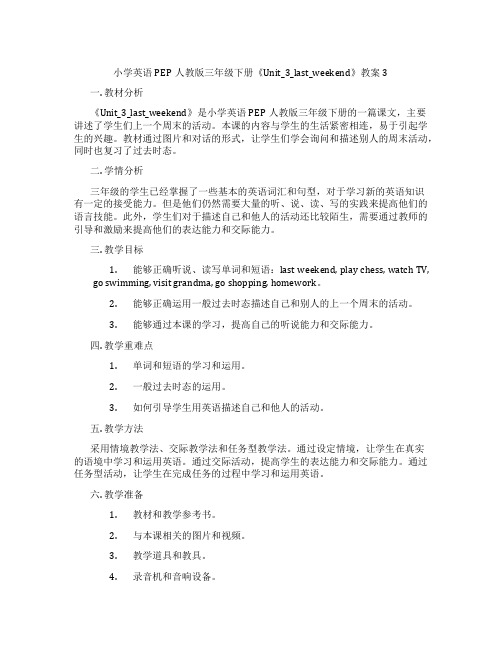
小学英语PEP人教版三年级下册《Unit_3_last_weekend》教案3一. 教材分析《Unit_3_last_weekend》是小学英语PEP人教版三年级下册的一篇课文,主要讲述了学生们上一个周末的活动。
本课的内容与学生的生活紧密相连,易于引起学生的兴趣。
教材通过图片和对话的形式,让学生们学会询问和描述别人的周末活动,同时也复习了过去时态。
二. 学情分析三年级的学生已经掌握了一些基本的英语词汇和句型,对于学习新的英语知识有一定的接受能力。
但是他们仍然需要大量的听、说、读、写的实践来提高他们的语言技能。
此外,学生们对于描述自己和他人的活动还比较陌生,需要通过教师的引导和激励来提高他们的表达能力和交际能力。
三. 教学目标1.能够正确听说、读写单词和短语:last weekend, play chess, watch TV,go swimming, visit grandma, go shopping, homework。
2.能够正确运用一般过去时态描述自己和别人的上一个周末的活动。
3.能够通过本课的学习,提高自己的听说能力和交际能力。
四. 教学重难点1.单词和短语的学习和运用。
2.一般过去时态的运用。
3.如何引导学生用英语描述自己和他人的活动。
五. 教学方法采用情境教学法、交际教学法和任务型教学法。
通过设定情境,让学生在真实的语境中学习和运用英语。
通过交际活动,提高学生的表达能力和交际能力。
通过任务型活动,让学生在完成任务的过程中学习和运用英语。
六. 教学准备1.教材和教学参考书。
2.与本课相关的图片和视频。
3.教学道具和教具。
4.录音机和音响设备。
七. 教学过程1.导入(5分钟)通过提问学生们的上一个周末的活动,引导学生思考和回忆,激发他们的学习兴趣。
2.呈现(10分钟)展示与本课相关的图片和视频,让学生们直观地了解本课的内容。
同时,引导学生用英语描述图片中的人物和活动。
3.操练(10分钟)通过小组活动,让学生们互相询问和描述上一个周末的活动。
小学英语PEP人教版三年级下册《Unit_3_last_weekend》教案7
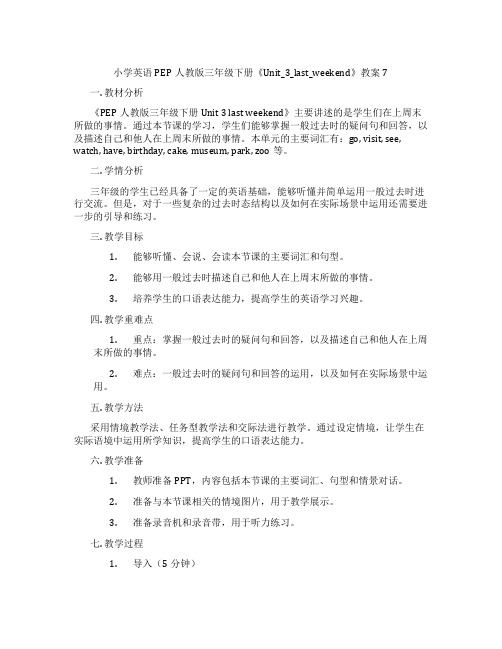
小学英语PEP人教版三年级下册《Unit_3_last_weekend》教案7一. 教材分析《PEP人教版三年级下册Unit 3 last weekend》主要讲述的是学生们在上周末所做的事情。
通过本节课的学习,学生们能够掌握一般过去时的疑问句和回答,以及描述自己和他人在上周末所做的事情。
本单元的主要词汇有:go, visit, see, watch, have, birthday, cake, museum, park, zoo等。
二. 学情分析三年级的学生已经具备了一定的英语基础,能够听懂并简单运用一般过去时进行交流。
但是,对于一些复杂的过去时态结构以及如何在实际场景中运用还需要进一步的引导和练习。
三. 教学目标1.能够听懂、会说、会读本节课的主要词汇和句型。
2.能够用一般过去时描述自己和他人在上周末所做的事情。
3.培养学生的口语表达能力,提高学生的英语学习兴趣。
四. 教学重难点1.重点:掌握一般过去时的疑问句和回答,以及描述自己和他人在上周末所做的事情。
2.难点:一般过去时的疑问句和回答的运用,以及如何在实际场景中运用。
五. 教学方法采用情境教学法、任务型教学法和交际法进行教学。
通过设定情境,让学生在实际语境中运用所学知识,提高学生的口语表达能力。
六. 教学准备1.教师准备PPT,内容包括本节课的主要词汇、句型和情景对话。
2.准备与本节课相关的情境图片,用于教学展示。
3.准备录音机和录音带,用于听力练习。
七. 教学过程1.导入(5分钟)教师通过提问学生“What did you do last weekend?”引导学生回答,复习一般过去时的疑问句和回答。
同时,引导学生思考上周末都做了些什么,为新课的学习做好铺垫。
2.呈现(10分钟)教师通过PPT展示本节课的主要词汇和句型,如“I went to the park.”“I saw a movie.”等,同时展示相关情境图片,让学生在实际语境中感知和理解一般过去时。
小学英语PEP人教版三年级下册《Unit_3_last_weekend》教案3
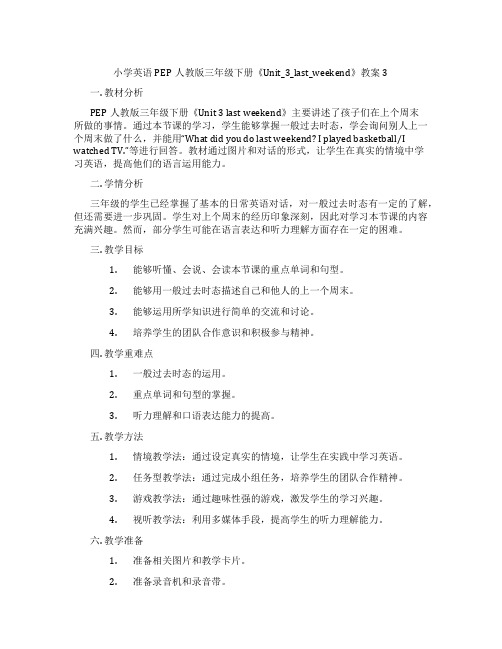
小学英语PEP人教版三年级下册《Unit_3_last_weekend》教案3一. 教材分析PEP人教版三年级下册《Unit 3 last weekend》主要讲述了孩子们在上个周末所做的事情。
通过本节课的学习,学生能够掌握一般过去时态,学会询问别人上一个周末做了什么,并能用“What did you do last weekend? I played basketball/I watched TV.”等进行回答。
教材通过图片和对话的形式,让学生在真实的情境中学习英语,提高他们的语言运用能力。
二. 学情分析三年级的学生已经掌握了基本的日常英语对话,对一般过去时态有一定的了解,但还需要进一步巩固。
学生对上个周末的经历印象深刻,因此对学习本节课的内容充满兴趣。
然而,部分学生可能在语言表达和听力理解方面存在一定的困难。
三. 教学目标1.能够听懂、会说、会读本节课的重点单词和句型。
2.能够用一般过去时态描述自己和他人的上一个周末。
3.能够运用所学知识进行简单的交流和讨论。
4.培养学生的团队合作意识和积极参与精神。
四. 教学重难点1.一般过去时态的运用。
2.重点单词和句型的掌握。
3.听力理解和口语表达能力的提高。
五. 教学方法1.情境教学法:通过设定真实的情境,让学生在实践中学习英语。
2.任务型教学法:通过完成小组任务,培养学生的团队合作精神。
3.游戏教学法:通过趣味性强的游戏,激发学生的学习兴趣。
4.视听教学法:利用多媒体手段,提高学生的听力理解能力。
六. 教学准备1.准备相关图片和教学卡片。
2.准备录音机和录音带。
3.准备教学课件。
七. 教学过程1.导入(5分钟)教师通过提问学生“What did you do yesterday?”引出本节课的主题。
让学生谈论自己上一个周末的经历,激发学生的学习兴趣。
2.呈现(5分钟)教师展示教材中的图片,让学生观察并回答问题。
如:“What are they doing? What did they do last weekend?”通过图片和问题引导学生学习本节课的重点单词和句型。
Unit 3 Last Weekend教学设计(6课时) 六年级英语
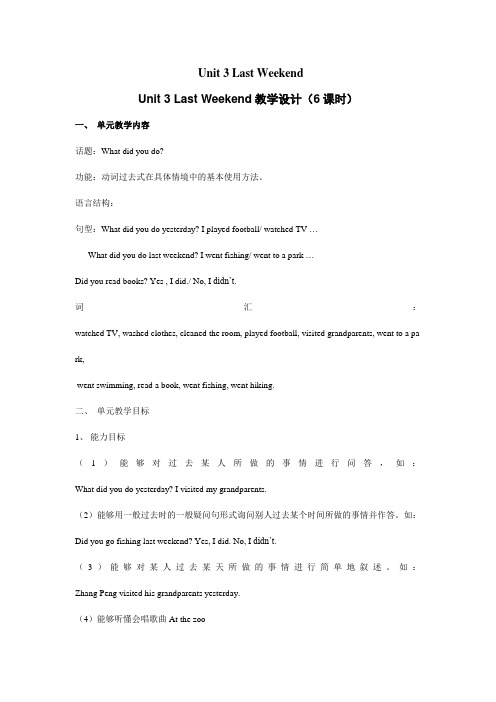
Unit 3 Last WeekendUnit 3 Last Weekend教学设计(6课时)一、单元教学内容话题:What did you do?功能:动词过去式在具体情境中的基本使用方法。
语言结构:句型:What did you do yesterday? I played football/ watched TV …What did you do last weekend? I went fishing/ went to a park …Did you read books? Yes , I did./ No, I didn’t.词汇:watched TV, washed clothes, cleaned the room, played football, visited grandparents, went to a pa rk,went swimming, read a book, went fishing, went hiking.二、单元教学目标1、能力目标(1)能够对过去某人所做的事情进行问答,如:What did you do yesterday? I visited my grandparents.(2)能够用一般过去时的一般疑问句形式询问别人过去某个时间所做的事情并作答。
如:Did you go fishing last weekend? Yes, I did. No, I didn’t.(3)能够对某人过去某天所做的事情进行简单地叙述。
如:Zhang Peng visited his grandparents yesterday.(4)能够听懂会唱歌曲At the zoo2、知识目标(1)能够掌握A,B部分Let’s learn,Let’s talk中的四会单词和四会句子。
(2)能够听,说,认读A,B部分Let’s talk中的句子。
(3)能够认读Pronunciation部分的音标:/p/, /f/ ,/h/, /s/, /ts/, / /, / /, / /.(4) 能够理解Let’s chant部分的内容,并能回答相应的问题。
小学六年级英语第三单元
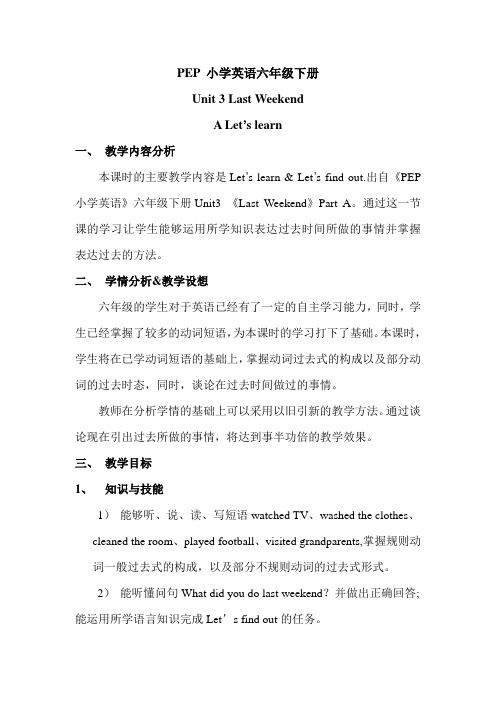
PEP 小学英语六年级下册Unit 3 Last WeekendA Let’s learn一、教学内容分析本课时的主要教学内容是Let’s learn & Let’s find out.出自《PEP 小学英语》六年级下册Unit3 《Last Weekend》Part A。
通过这一节课的学习让学生能够运用所学知识表达过去时间所做的事情并掌握表达过去的方法。
二、学情分析&教学设想六年级的学生对于英语已经有了一定的自主学习能力,同时,学生已经掌握了较多的动词短语,为本课时的学习打下了基础。
本课时,学生将在已学动词短语的基础上,掌握动词过去式的构成以及部分动词的过去时态,同时,谈论在过去时间做过的事情。
教师在分析学情的基础上可以采用以旧引新的教学方法。
通过谈论现在引出过去所做的事情,将达到事半功倍的教学效果。
三、教学目标1、知识与技能1)能够听、说、读、写短语watched TV、washed the clothes、cleaned the room、played football、visited grandparents,掌握规则动词一般过去式的构成,以及部分不规则动词的过去式形式。
2)能听懂问句What did you do last weekend?并做出正确回答; 能运用所学语言知识完成Let’s find out的任务。
2、过程与方法•通过以旧引新、创设情景帮助学生理解文本信息。
•通过多媒体创设真实情境,培养他们的听说交际能力。
•通过拓展性练习活动,培养学生语言运用的能力。
•通过小组活动,培养学生小组合作意识。
3、情感态度与价值观培养学生养成良好的生活、学习习惯。
学会用英语叙述自己做过的事情。
四、教学重难点1)重点:听说读写短语watched TV、washed the clothes、cleaned the room、played football、visited grandparents;能听说句子What did you do last weekend?并能就过去时间所做的事情进行简单回答.2)难点:学生对本课的几个短语都比较熟悉,但动词的过去式第一次出现,因此,这几个短语的动词过去式的构成及其发音是本课时的难点。
PEP人教版六下英语Unit 3 Last Weekend教学设计

Unit 3 Last Weekend一、Teaching content:Part A Let’s learn Let’s read二、Teaching objectives1.To read and understand Let’s read.2.To finish the exercises about Let’s read.3.To understand the sentences: What did you do last weekend? and canmake the answers.4.To be able to read the phrases: watched TV\washed theclothes\cleaned the room\played football and visited grandparents.三、Teaching key points1.The pronunciation of the new phrases.2.The usage of the past tense.四、Teaching difficult points1.The pronunciation of the new phrases.五、Teaching stepsStep one: Warm up1.A guessing game. To guess what do I usually do on the weekend.2. Free talk about the Ss’ weekend.Step two: Presentation1.Listen to the passage and circle the phrases in the passage.(Let’s read)2.Listen again and find out what did WuYifan do last Saturday and lastSunday.(The exercise on the Ss’ exercise books.)3.Read the activities WuYifan do last weekend.4.Find out how does [ed] pronounce.([t][d][id])5.Retell WuYifan’s last weekend.6.Present “What did you do last weekend” and do a pair work.Step three: Practice1.Finish the exercises on the Ss’ exercise books.Step four: Homework1.Copy the phrases.Step five: Blackboard designUnit 3 Last WeekendWhat do you usually do on the weekend?do homeworkI usually clean the room on the weekend .cook mealswash the clothesWhat did you last weekend?watched TVcleaned the roomcooked mealsI washed the clothes last weekend .visited grandparentsplayed football。
pep六年级英语下册Unit 3 Last Weekend 教案
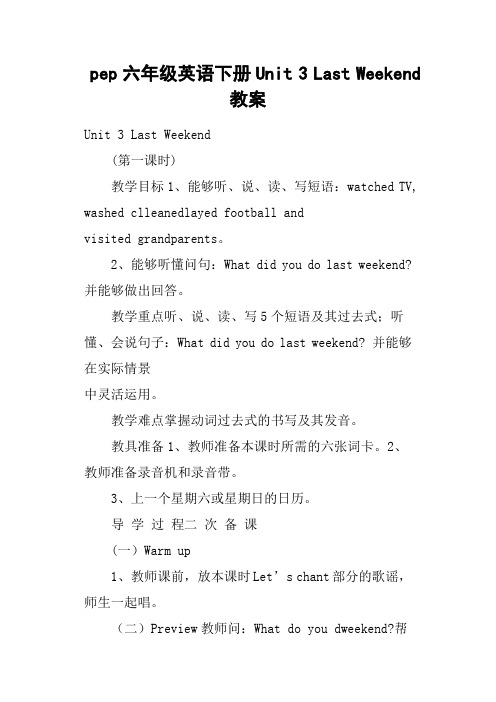
pep六年级英语下册Unit 3 Last Weekend教案Unit 3 Last Weekend(第一课时)教学目标1、能够听、说、读、写短语:watched TV, washed clleanedlayed football andvisited grandparents。
2、能够听懂问句:What did you do last weekend? 并能够做出回答。
教学重点听、说、读、写5个短语及其过去式;听懂、会说句子:What did you do last weekend? 并能够在实际情景中灵活运用。
教学难点掌握动词过去式的书写及其发音。
教具准备1、教师准备本课时所需的六张词卡。
2、教师准备录音机和录音带。
3、上一个星期六或星期日的日历。
导学过程二次备课(一)Warm up1、教师课前,放本课时Let’s chant部分的歌谣,师生一起唱。
(二)Preview教师问:What do you dweekend?帮助学生回忆学过的动词短语并引导。
学生回答。
教师可以继续提问:How doyou feel when you go hiking?引导学生回答。
(三)Presenta、师: Now I know what do you dweekend. Guess what I usually dweekend?师可适当的做动作提示学生。
学生猜出后,教师说:Yes, that’s right. I usually cleaweekend. But I didn’t clealast weekend.师拿出一张当天的日历,说:What daday?引导学生回答:It’s ……然后师出示上一个周末的日历,说:……was Saturday/Sunday. It was last weekend. (板书last weekend)生跟读。
2.师说:Last weekend, I didn’t cleaI was tired but I was very happy. What did I do? Please guess. 学生通过出示不同的短语卡片进行猜测,师先板书相关动词短语:play football ,然后再用不同颜色的粉笔标上过去式的后缀-ed.师带读动词短语的过去式,学生模仿跟读。
Unit 3 Last Weekend说课稿

Unit 3 Last Weekend说课稿Unit 3 Last Weekend说课稿,说教材本单元教学重点是让学生学会表达在过去时间内所做的事情,教材内容围绕话题:“What did you do?”展开,本课在以往所学的短语和句型的基础上,新授一般过去时的表达方式.本课时的教学内容是新授wash clothes、clean the room等词汇的一般过去时及What did you do last weekend?的问答,为将来多种语态的学习打下基础.说目标根据本教材的特点及新课标对六年级学生学习英语的要求,制定以下教学目标.1. 教学目标认知目标能够听、说、读、写短语watched TV、washed clothes、cleaned the room、played football、visited grandparents,掌握一般动词过去时的构成以及部分不规则动词的过去时形式;能听懂问句What did you do last weekend?并做出正确回答;能运用所学语言知识完成Let’s find out的任务.能力目标能够用一般过去时描述自己在过去时间里所做的事情.情感目标通过本课语言知识的学习,教育学生熟悉身边的人所做的事情,并能经常做到关心他人.2. 教学重难点重点: 听说读写短语watched TV、washed clothes、cleaned the room、played football、visited grandparents,能听说句子What did you do last weekend?并能就过去时间所做的事情进行简单回答.难点: 学生对本课的几个短语都比较熟悉,但动词的过去式形式时第一次出现,因此,这几个短语的动词过去式的构成及其发音是本课时的难点.教学过程中可以通过相互比较强化操练来突破此难点.说教法1. 教法设计在应用任务型教学法的大前提下,利用情景教学法,以学生为中心,以交际为主线,通过一系列的教学活动吸引学生的注意力,有利于学生学习英语知识,发展语言技能.我们提倡用整句教学法,因为虽然信息交流一般利用单词或短语来实现,但要让学生学会使用英语,必须培养他们使用整句的能力.2. 学法指导在学习语言中注重以人为本,让学生感到他们是一个发现者、研究者和探寻者.在本课的学习活动中,用多媒体课件辅助教学,以多种合作学习的方式来帮助学生自己去探索、发现和解决问题,让学生在互动和交流中建立自信,感受学习的快乐.3. 教学手段用多媒体辅助教学,将英语学习和游戏结合,引导学生积极主动地投入到学习活动中去.说过程1. 导入设计(1)warm--up安排两个chant:Book 6 Unit 6 what do you do on the weekends和Book 5 Unit 4 what can you do?(2)Free talk设计思路上新课之前,利用Daily report和猜单词地游戏,使学生进一步巩固已学的对话及单词,然后通过说唱回忆一些动词短语,并提问Wjhat do you usually do on the weekend?让学生谈谈自己的周末都做了哪些事情,达到复习play football等本课所涉及的动词短语的目的,为新课的学习做好铺垫.2. 新课呈现CAI呈现一个日历:Saturday提问:What day is it today?学生回答:It’s Saturday。
小学英语PEP人教版三年级下册《Unit_3_last_weekend》word版教案2

Unit 3 last weekend第二课时一、教学内容:A Let’s try Let’s talk Let’s find out C Good to know二、教学目标与要求1、能够听说读写句型:What did you do last weekend? I played football. 并能够在实际情景中运用。
2、能够用过去式的一般疑问句形式进行简单的提问,如:Did you clean the room? Yes, I did. / No,I didn’t.3、能够听懂并完成Let’s try部分的联系。
4、能够运用新语言完成Let’s find out 中的任务。
5、了解Good to know当中的标志的意思。
三、教学重点能够听说读写句型:What did you do last weekend? I played football.并能够在实际情景中运用。
四、教学难点学生初步了解动词过去式的一般疑问句形式。
识记help的意思。
五、课前准备1、教师准备若干张图片。
2、教师准备录音机与磁带。
3、教师准备该课时的教学挂图。
4、学生准备一张调查表。
六、教学过程1、Warm-up(1)、Enjoy the song: At the zoo(2)、Daily oral practiceGood morning. Glad to meet you. How are you? What day is today? What’s the weather like today? 2、Preview(1)、Activity 1(2)、Let’s try.T: What did you do last weekend?S: …T: What about Chen Jie?3、Presentation and practiceLet’s talk设计主情景“我是小小侦探”(1)、“谁打扫了教室”教师用课件动画形式出现一个明亮干净的教室。
六年级下册英语-Unit 3 Last Weekend第三课时

last weekend Saturday morning Saturday afternoon Saturday evening Sunday morning Sunday afternoon Sunday evening
(1)采访一个同学的周末活动,准备口头汇报。 (2)完成活动手册上相应的练习。
Listen and answer the questions.
• What did Wu Yifan do Saturday morning? • Whom did he visit? Why? • What did they do together? • What did they do in the evening? • What did Wu Yifan do Sunday morning? With
whom? 1. What did Wu Yifan do in the afternoon?
was—is It is June the 2nd today. It was June the 1st yesterday.
busy—free He is busy today. He has many things to do. Are you yesterday?
A game对话梦工厂
He watched TV.
What did he do Saturday morning?
A game对话梦工厂
watched TV washed clothes cleaned the room played football visited grandparents listened to music
It was …’s birthday.
…’s This is Amy’s schoolbag. Yesterday was Teachers’ Day.
小学英语教案Unit 3 Last Weekend 第三课时教案
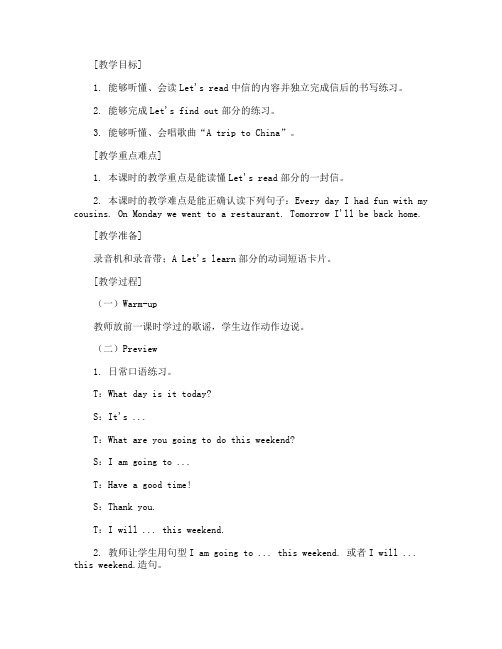
[教学目标]1. 能够听懂、会读Let's read中信的内容并独立完成信后的书写练习。
2. 能够完成Let's find out部分的练习。
3. 能够听懂、会唱歌曲“A trip to China”。
[教学重点难点]1. 本课时的教学重点是能读懂Let's read部分的一封信。
2. 本课时的教学难点是能正确认读下列句子:Every day I had fun with my cousins. On Monday we went to a restaurant. Tomorrow I'll be back home.[教学准备]录音机和录音带;A Let's learn部分的动词短语卡片。
[教学过程](一)Warm-up教师放前一课时学过的歌谣,学生边作动作边说。
(二)Preview1. 日常口语练习。
T:What day is it today?S:It's ...T:What are you going to do this weekend?S:I am going to ...T:Have a good time!S:Thank you.T:I will ... this weekend.2. 教师让学生用句型I am going to ... this weekend. 或者I will ... this weekend.造句。
(三)Presentation and PracticeLet's read1. 教师问:What did you do last Saturday? 学生回答:I ... 教师指导学生用单词last组词,如:last week, last month, last year等。
2. 教师请学生说说下列词组的反义词:next week --- last week, last Monday --- next Monday, last month --- next month, next holiday --- last holiday, next trip --- last trip。
- 1、下载文档前请自行甄别文档内容的完整性,平台不提供额外的编辑、内容补充、找答案等附加服务。
- 2、"仅部分预览"的文档,不可在线预览部分如存在完整性等问题,可反馈申请退款(可完整预览的文档不适用该条件!)。
- 3、如文档侵犯您的权益,请联系客服反馈,我们会尽快为您处理(人工客服工作时间:9:00-18:30)。
Unit 3 Last Weekend 第三课时教学设计
永安中学
教学目标:
1. 能够听懂、会读Let's read中信的内容并独立完成信后的书写练习。
2. 能够完成Let's play的游戏。
教学重、难点:
1. 本课时的教学重点是能读懂Let's read部分的一封信。
2. 本课时的教学难点是能正确认读下列句子:Wu Yifan was busy last wekend. He visited his grandmother Saturday morning…
教学准备:
录音机和录音带;A Let's learn部分的动词短语卡片。
教学过程:
(一)Warm-up
教师放前一课时学过的歌谣,学生边作动作边说。
(二)Preview
1. 日常口语练习。
T:What do you usually do on the weekend?
S:I usually visit my grand parents...
T:What did you do last weekend?
S:I watched TV ... .
2. 教师让学生用句型I usually … on the weekend. 造句。
(三)Presentation and Practice
Let's read
1. 教师问:What did you do last Saturday? 学生回答:I ... 教师指导学生用单词last组词,如:last week, last month, last year等。
2. 教师请学生说说下列词组的过去式:
Wash—washed, visit—visited, watch—wathched, play-- played
3. 教师描述自己一个星期内的活动:On Monday I played football. On Tuesday I played ping-pong. On Wednesday I ...,然后教师问学生:What did I do on Monday/ Tuesday/... 让学生凭记忆回答。
最后教师说:I did a lot of things last week. Everyday I had fun. 板书had 和have,指导学生拼写这两个词。
4. Wu Yifan had a busy weekend. What did Wu Yifan do last weekend?
教师放Let's read部分的录音,学生跟读。
5. 根据板书描述Wu Yifan’s weekend.
6. 教师指导学生完成短文后面的练习。
Let's play
记忆力游戏:教师提问What did you do last weekend?
请学生起来回答,后面的学生必须重复前面同学提到的动词短语,并要另外增加一个动词短语,还不得重复前面的。
最后哪位同学说的最多,谁的记忆力就最好。
Make a survey:
通过这个活动,提高小组协作能力,巩固所学知识。
(四)Consolidation and Extension
做课堂作业。
